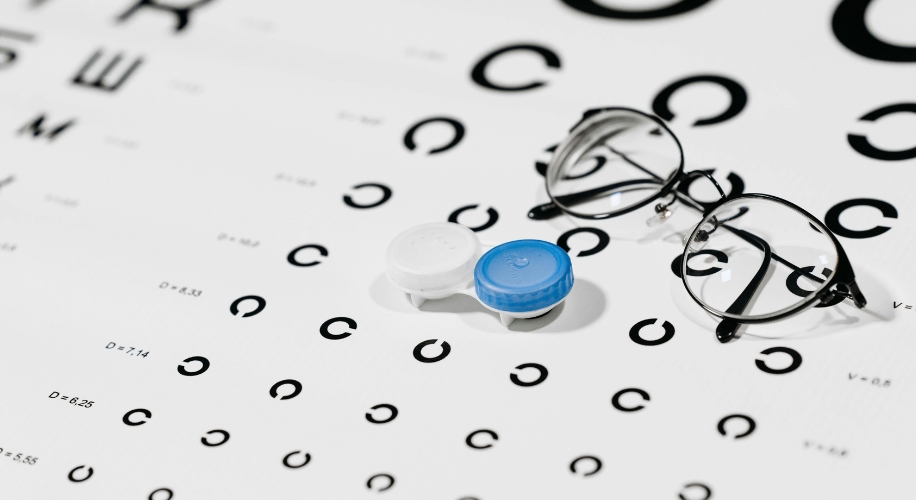Using Hydrogen Peroxide for Contact Lens Care
When it comes to maintaining the cleanliness and comfort of your contact lenses, proper care is crucial. While there are many solutions available, hydrogen peroxide has emerged as a popular choice for disinfecting lenses. In this blog, we’ll explore the benefits and risks of using hydrogen peroxide for contact lens care, and provide tips for safe usage.
Photo by Sebastian Sørensen
What is Hydrogen Peroxide?
Hydrogen peroxide (H₂O₂) is a chemical compound commonly used as a disinfectant and antiseptic. In its standard form, it’s a clear, slightly acidic liquid that is often found in households for various cleaning and medicinal purposes. For contact lens care, it’s typically used in a diluted form, usually around 3%, to effectively disinfect and clean lenses.
Benefits of Hydrogen Peroxide for Contact Lenses
1. Effective Disinfection
Hydrogen peroxide is highly effective at killing bacteria, viruses, and fungi. Its strong oxidizing properties make it an excellent choice for disinfecting contact lenses. Unlike multipurpose solutions, which can leave behind residues, hydrogen peroxide breaks down into water and oxygen, leaving no harmful residues on your lenses.
2. No Preservatives or Additives
Many multipurpose contact lens solutions contain preservatives and other chemicals that can sometimes irritate the eyes. Hydrogen peroxide, on the other hand, is free of these additives. This can be particularly beneficial for those with sensitive eyes or allergies.
3. Suitable for All Types of Lenses
Hydrogen peroxide cleaning systems are versatile and can be used for all types of contact lenses, including soft, rigid gas permeable (RGP), and silicone hydrogel lenses. This makes it a convenient choice if you have multiple types of lenses or if you switch between them.
How to Use Hydrogen Peroxide Safely
1. Use the Right System
When using hydrogen peroxide for contact lens cleaning, it’s essential to use a hydrogen peroxide-based cleaning system specifically designed for contact lenses. These systems typically come with a special case that neutralizes the hydrogen peroxide, turning it into harmless water and oxygen. Never use regular household hydrogen peroxide on your lenses.
2. Follow the Instructions
Carefully follow the instructions provided with your hydrogen peroxide cleaning system. This usually involves placing your lenses in the provided case and allowing them to soak for a designated period, typically 6 to 8 hours. You should not wear your lenses before the neutralization process is complete.
3. Avoid Direct Contact
Hydrogen peroxide should never come into direct contact with your eyes. Always handle your lenses with clean, dry hands, and avoid splashing or spilling the solution. If you accidentally get hydrogen peroxide in your eyes, rinse thoroughly with water and seek medical advice if irritation persists. Do not rinse your contacts with hydrogen peroxide solution immediately before wearing them, as it can cause severe irritation or burns to your eyes.

Photo by Nataliya Vaitkevich
Risks and Precautions
1. Chemical Burns
Improper use of hydrogen peroxide can lead to chemical burns and severe irritation. This risk is mitigated by using a system with a neutralizing agent and following the instructions carefully. Always make sure the lenses have been fully neutralized before placing them in your eyes.
2. Extended Soaking Times
Hydrogen peroxide solutions require a longer soaking time compared to multipurpose solutions. Failing to allow the lenses to soak for the recommended period will result in irritation and discomfort. Make it a habit to clean your lenses at night so they’re ready to wear in the morning.
Photo by Pavel Danilyuk
Conclusion
Hydrogen peroxide can be a highly effective and safe option for disinfecting contact lenses when used correctly. Its ability to provide thorough disinfection without leaving behind residues makes it a great alternative to multipurpose solution. However, it’s crucial to use the proper system and follow safety guidelines to avoid potential risks. If you have any concerns or experience issues, consulting with your eye care provider is always a good practice.



